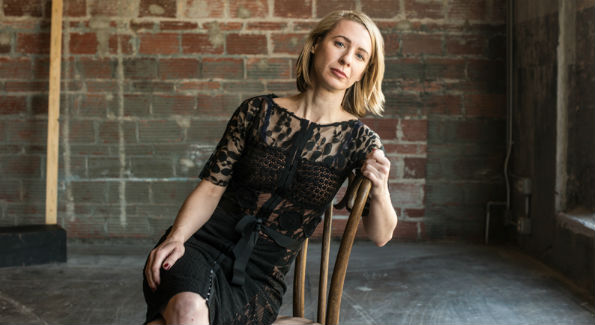Mark O’Rowe’s contemporary version of the Ibsen classic comes to Studio Theatre.

Hedda Gabler cast member Julia Coffey as Hedda Tesman (Photo by Teddy Wolff)
There is a recognition of the timeless universality of Henrik Ibsen’s “Hedda Gabler” in Mark O’Rowe’s new version of the play at Studio Theatre. The troubled Hedda is the same, but she now lives in a contemporary off-white décor home with glass and chrome coffee and side table that isn’t the 19th century stifling world Ibsen created.
While the Studio Theatre production is brilliant, the 21st Century setting evokes some confusion in that a contemporary woman would have alternatives that Ibsen’s Hedda doesn’t. What is important is Ibsen’s genius that comes through and overrides the modern setting.
The cast, headed by a mesmerizing Julia Coffey in the complex emotional roller coaster title role, is impressive and brilliant.
Hedda lives in a conservative Norwegian world.
She is willful and devious, but is a captive of convention, and vacillates between what she wants to do while fearing scandal.
“Hedda Gabler” opens with Hedda Tasman returning to Oslo from a six month honeymoon with her hapless, conventional husband Jorge Tesman (Avery Clark). She realizes her mistake in marrying a tedious academic who spent more time on their honeymoon researching and collecting materials for a book he plans to write than he did with her. He is focused on gaining a professorship and she is not looking forward to being the wife of an academic.
Hedda is intelligent and head-strong. She is the only child of a general and she knows about guns and horses and has little to no interest in children or being the supportive wife. She is a devious woman who knows how to manulate and to get others to reveal information that would better be left unsaid. Coffey handles the emotionally complex, often unlikable Hedda, with a respect and a comprehension of the brilliant, spare Ibsen dialogue. Her performance is central and she always has it under control.
Ibsen is a playwright who brought theatrical realism into the modern era. The script is fast and sharp. There are no monologues; just terse dialogue that under Matt Toney’s direction is almost breathless. The back and forth between the smart cast effectively captures Hedda’s aspirations and frustrations she finds she can neither accept nor escape. The conversations are disjointed, often with incomplete sentences that makes the dialogue sound modernly familiar.
“Hedda Gabler” is an unavoidable tragedy.
At one point near the end of the first act, sound designer Fitz Patton, produces a single note sustained sound, faint but omnipresent. It hangs ominously and effectively creates a sense of dread.
Hedda’s husband Jorge is unaware that his wife could in any way be unhappy. He thinks Hedda wanted the large house he bought for her with help from his aunt Julie (Kimberly Schraf), a women who reared him and who Hedda insults.
Schraf’s Julie is unflappable. She projects a Norwegian older woman comfortable in her role. She loves Jorga and wants to love Hedda and the children she happily anticipates.
Hedda’s is further upset with the visit of Thea Elvsted (Kimiye Corwin), who has come to Oslo to find Ejlert Lovborg). Unlike Hedda, she is willing to defy convention and face scandal in escaping from a loveless marriage to join Lovborg, a former drunk who has cleaned up his behavior and has published a book that is likely to earn him the professorship Jorge expects.
Thea’s nervous excitement stimulates Hedda’s jealousy, since she had rejected Elvsted who she saw as having an unsuccessful future. Into the the Tesman household comes a supposed family friend, the arrogant, Judge Brack, played with a creepy smarminess by Michael Early.
He is sexually interested in Hedda and from what he learns about Hedda’s tragic scheming, he hopes to control her emotionally and physically.
The 19th century Hedda sees no way out of the culture of 19th century Oslo. This is where, if you see Hedda as a 21st century woman, it is difficult to accept there is no way out. A modern woman could dump her husband, have affairs and be indifferent to what conventional people would think.
You can redress Hedda and give her a contemporary setting, but she is of the century Ibsen was so careful to expose. That aside, the performances and Studio Theatre staging of Hedda Gabler is exceptional theater, an experience to savor.
Hedda Gabler runs through June 19 at Studio Theatre.
Visit studiotheatre.org for ticket information.




